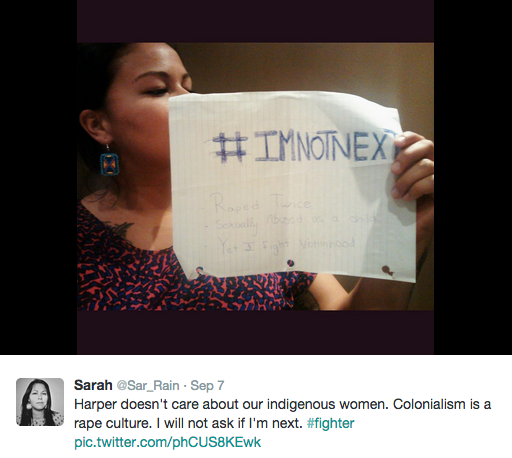“I’m Not Next.”
A chorus of resistance is rising on social media this week, as Indigenous girls and women take a stand against furthering their portrayal as victims by posting pictures of themselves with the hashtag #ImNotNext.
This campaign is a shift from a parallel social media movement #AmINext to push for a national inquiry into missing and murdered Indigenous girls and women (MMIWG). In that campaign, women post pictures of themselves to twitter holding signs asking “Am I Next?” The impact of both campaigns lies in the fact that they have been initiated by Indigenous women, and are examples of self-determined approaches to resisting violence. Social media is revealing the ways in which individual women, men, Two-Spirit and trans people are actively resisting colonialism in their everyday lives, not just waiting for state officials to “save” them.
This same refusal to be portrayed as victims was evident last week during the Bill C-36 hearings into proposed sex work legislation, as sex workers, on social media and in the hearings, insisted they are “not your rescue project.” Sex workers and their supporters addressed the dangers of the proposed new legislation, maintaining that criminalization will not increase the safety of sex workers but will, in fact, increase the stigma and violence they face.
Yet despite this shared refusal to be portrayed as victims in need of “saving” by the colonial government, the direct links between the “I’m Not Next” campaign and Bill C-36 legislation remain thin.
Indeed, both the MMIWG campaigns to support the visibility of Indigenous women’s resistance to violence did not tie in to the ongoing Bill C-36 hearings. In fact, rather than supporting or amplifying sex workers’ voices in anti-violence campaigns, social media has been used to attack some Indigenous sex work advocates.
There is a discomfort, it seems, in linking violence against Indigenous women and the rights and safety of sex workers. Despite the fact that these issues are deeply related in the lives of sex workers who are among the missing and murdered, the voices and needs of sex workers remain sidelined in much national and local-level MMIWG dialogue. Indeed, as Indigenous sex work activist Naomi, of the blog kwetoday, astutely observes, whorephobia is all too pervasive in anti-violence advocacy.
The dehumanization of Indigenous people through sexualized stereotypes has been central to the colonial project, as these portrayals have been used to justify violence against us. Yet I fear that in rejecting these stereotypes, especially those around our sexuality, we have rejected sex workers and others who embody sexuality in ways we have been taught are shameful. This internalized shame (or whorephobia) has led some anti-violence advocates to conflate sex work with victimization, and to turn their back on sex workers.
Yet this has not always been the case. In fact, the roots of advocacy around missing and murdered women began in the downtown east side of Vancouver, with the lives and voices of sex workers front and centre. As the issue has grown nationally, however, Indigenous sex workers have been sidelined and MMIWG awareness campaigns have been framed without the inclusion of the rights of sex workers. Indeed, the Native Womens Association of Canada wrote a letter in support of Bill C-36, taking a stand alongside the federal government rather than standing with Indigenous sex workers themselves.
As an Indigenous woman with a long history of anti-violence activism, I find any support for the criminalization of sex work in the name of ‘saving’ sex workers to be reprehensible. With Indigenous women representing 41 per cent of female federal inmates, we know all too well that the criminal justice system is meant to punish, not to bring about healing. The lives of Indigenous sex workers, like all Indigenous people, will be improved by measures sex workers determine themselves at a local level, as trading sex in northern and remote areas looks very different than in urban centers. A self-determined approach to safety for sex workers begins with strengthening relationships in our communities so that we can better hear and support these local efforts.
Together, “I’m not next” and “I am not your rescue project” highlight the necessity and responsibility to ensure MMIWG campaigns recognize the particular ways sex workers are impacted by Canadian law. As Indigenous people, our refusal to be portrayed as victims must extend to all members of our communities, including youth, sex workers and many others whose “vulnerability” is all too often used as an excuse for colonial interventions into our homes and communities. We need to remember it is the systems and ideologies of colonial society that make us vulnerable, not our Indigeneity, our age, our sexuality, our ability, nor how we make a living.
Sarah Hunt (PhD) is a writer, educator and activist currently based in Lkwungen Territories (Victoria, BC) and is of Kwagiulth (Kwakwaka’wakw), Ukrainian and English ancestry. She has more than 15 years’ experience doing community-based work on issues of justice, education and cultural revitalization in rural and urban Indigenous communities across B.C. Most recently, Sarah’s research investigated the relationship between law and violence in ongoing neocolonial relations in BC, asking how violence gains
visibility through Indigenous and Canadian socio-legal discourse and action. She is particularly concerned with revitalizing Indigenous law and relations of accountability through local level anti-violence initiatives. You can follow her on twitter @thesarahhunt
Photo: Sar_rain twitter



